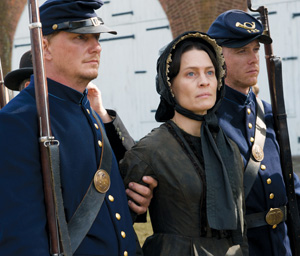

ROBERT REDFORD’S The Conspirator is one of those pieces of history that Howard Zinn liked to unearth. It’s a shameful episode—from 1865—and it deserves to be remembered.
James Solomon’s script had been lingering for more than a decade. The toughness of the subject matter was perhaps a good reason for producers to just say no, even more than the expense of re-creating Washington, D.C., in 1865. (It’s done here with thrift, by shooting in Savannah; nearby Ft. Pulaski substitutes for the penitentiary where most of the action takes place.)
The Conspirator begins with the victory celebration in Washington, D.C., for the end of the Civil War and with Lincoln’s fateful decision to see Our American Cousin. The audience’s hopes are raised early. The deadly John Wilkes Booth is a great part for any actor, and Toby Kebbell gives the film a jolt as he dashes off the fateful balcony and crashes onto the stage of Ford’s Theatre.
But Booth is out of the picture fast, killed in a burning barn. Meanwhile, Secretary of War Edwin Stanton (Kevin Kline) pulls a full Alexander Haig (“I’m in charge here”) right after the shooting.
The implication is that Vice President Andrew Johnson would be too drunk to take over the investigation into who killed Lincoln. (This ill-fated Johnson got an unfair reputation as a drunkard for showing up crocked at Lincoln’s second inaugural, in 1864. Interestingly, the Tennessean made a speech that sounds like the classic Nixon/Boehner sobbing oration: the one about the rise from absolute nothingness, scrubbing the fruit stand, the tavern or whatnot.)
Booth’s accused accessories are rounded up, including the famous Dr. Mudd. Caught in the dragnet is one female prisoner: the landlady Mrs. Mary Surratt (Robin Wright), whose son had been in cahoots with Booth. Imprisoned, the 42-year-old woman “who kept the nest that hatched the egg” refuses to inform.
She is defended by Maryland Sen. Reverdy Johnson (Tom Wilkinson). Assisting the senator is one Frederick Aiken, a veteran; he’s played by James McAvoy, filling the outline of the part with little enthusiasm.
The trial of the conspirators was a military tribunal, on the grounds that Lincoln was a military commander himself. The film focuses on the one member of the accused who is less obviously guilty. Wright underplays the part of this suffering prisoner with Scandinavian-movie simplicity (you have to underplay when you’re wearing a ball and chain), but there’s not enough tension and flamboyance among the other actors to counterbalance her kind of purity.
Unfortunately, Wilkinson rolls out of the picture. As Joseph Holt, the prosecutor, Danny Huston seems ready for some kind of deviltry, but it never happens.
The movie rarely leaves the dungeon. The murky would-be daguerreotype photography, and the mutter of voices makes The Conspirator a movie for those with sleep disorders to avoid.
The earnestness—always a problem in Redford films—runs at an all-time high. The script tells about the ambient fear and rage in America 1865, but the visuals don’t give the sense of a state of emergency or of post-war shock. We know there’s resentment: Aiken gets kicked out of his private club, and his fiancee, played by Alexis Bledel, does the time-honored bit about the woman who may not be waiting when her man gets back from the courtroom.
Of the various figures stirring in the murk, Stephen Root, as a witness for the defense, is the one who looks most 19th century: it’s a relief to see someone in the movie who isn’t of the well-spoken classes—someone who embodies the rural nature of our nation then.
But is this movie really about 1865? Throughout this trial of Mrs. Surratt, we can feel Redford whispering in our ear: “Stanton is like Cheney, no? This suspension of rights—remarkable how it anticipates Gitmo. Military tribunals and the hooding of prisoners are like Abu Ghraib. Did you notice the parallels?” And we do, but the parallels aren’t enough to make the stumbling and verbose film breathe. It’s more or less killed by a search for relevance, instead of a search for uniqueness or mood.
PG-13; 123 min.



